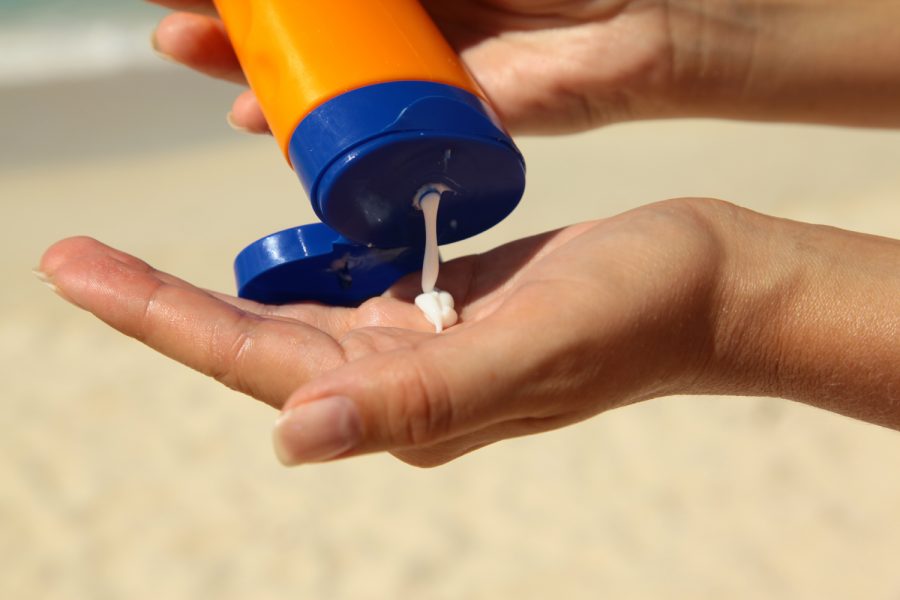Guest Opinion | The Doctor is In: How you can stay safe in the sun all year-round
Even though the summer days are nearing an end, it’s important to protect your skin all year round.
Woman holding and applying suntan lotion on a beach.
August 29, 2021
Although the summer days are drawing to a close, our concern for sun safety and protection shouldn’t end. Skin cancer is one of the most common cancers in the U.S. In fact, one in five Americans will develop skin cancer in their lifetime, and almost 9,500 people in the U.S are diagnosed with skin cancer every day. Sunburns at a young age can increase the odds of developing skin cancers, like melanoma, later in life. Skin cancer can affect anyone, regardless of age or race.
Sunscreen not only prevents sunburns, but also helps to prevent early skin aging and the development of skin cancer. It may come as a surprise to many, but it is recommended that anytime you are planning to be outside, you should apply sunscreen before heading out the door.
The sun emits ultraviolet (UV) rays, even on cloudy days, that can affect the skin. According to the American Academy of Dermatology, some of the general recommendations to look for in a sunscreen is that it provides: (1) broad-spectrum protection against UVA and UVB rays (2) water resistance, (3) and sun protection factor (SPF) 30 or higher.
You’re probably wondering, what is SPF? SPF is a measure of how well the sunscreen protects skin against sunburn. Despite how this sounds, a higher SPF sunscreen does not necessarily equal better. The more important factor is coverage of the sunscreen on all sun-exposed surfaces.
It’s also important to apply the correct amount to provide the best protection. Most individuals use less than the recommended amount advised. Adults typically need about one ounce to cover their body, reapplied approximately every two hours and after sweating or swimming.
It’s important not to rely on sunscreens alone to protect your skin. In fact, no single method of sun defense can perfectly protect you. Sunscreen coupled with sun-protective clothing can be an effective way to give your skin some extra protection.
Some fabrics are rated for their ultraviolet protection factor that ensures an extra level of reassurance. Simple guidelines to follow when choosing clothing include wearing darker-colored fabrics and densely woven fabrics. This will offer more protection compared to sheer clothing.
For example, a regular plain white t-shirt has an SPF of approximately 7, whereas a long-sleeved denim shirt provides an SPF of 1700. In addition, wearing sunglasses with UV protection, wide-brimmed hats, and shoes that cover your feet are simple decisions, yet effective strategies to limit your sun exposure. The bottom line: the more you cover, the better.
Some additional tips to keep in mind when thinking about your skin health: avoid tanning beds as this is a risk factor for developing skin cancer. Monitor your skin regularly for changes. If you ever notice spots of concern or have questions about your skin health, talk with your local dermatologist or healthcare provider.
-Pavane L. Gorrepati, fourth-year medical student at the University of Iowa Carver College of Medicine



